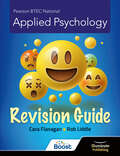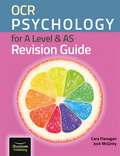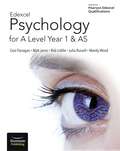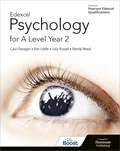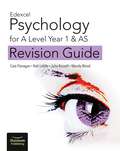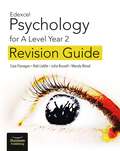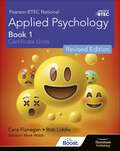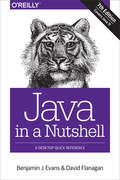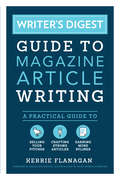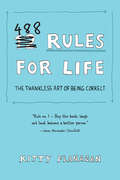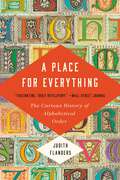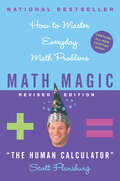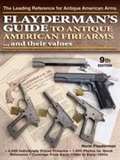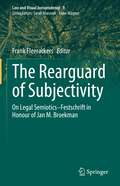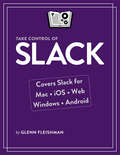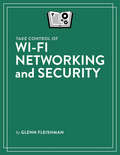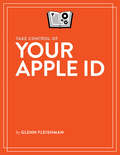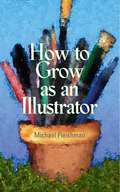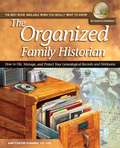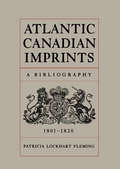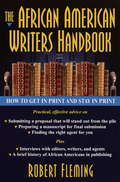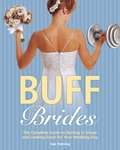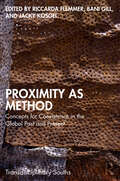- Table View
- List View
BTEC National Applied Psychology: Revision Guide
by Cara Flanagan Rob LiddleEverything students need to know for their exam! Written by leading authors Cara Flanagan and Rob Liddle, this new Revision Guide has been designed to accompany the Revised Edition Student Books 1 and 2.Each topic is covered on one spread helping students get straight to the point, with helpful revision features:- Spec spotlight explains what they need to know in that topic.- Apply it offers lots of opportunities to practice application skills.- Revision boosters provide invaluable exam hints and tips.- Exam-style questions at the end of each section provide an opportunity for realistic practice.
OCR Psychology for A Level & AS Revision Guide
by Cara Flanagan Jock McGintyCovering the A Level and AS, this portable-sized guide is ideal for consolidating knowledge both at home for revision, and at school as a lesson-by-lesson summary as the course progresses. // Every AS and A Level core/key study covered on one concise spread. // Evaluation points provided for the methodical issues on each study. // Links are made to areas, debates, perspectives and applications. // Covers research methods and mathematical skills. // Exam skills and techniques are reinforced with a dedicated section of advice and guidance. // Invaluable exam tips are provided throughout. // Exam-style questions provide plenty of exam practice.
Edexcel Psychology for A Level Year 1 and AS: Student Book
by Cara Flanagan Julia Russell Mandy Wood Matt Jarvis Rob LiddleWritten by leading psychology authors, Cara Flanagan, Matt Jarvis, Rob Liddle, Julia Russell and Mandy Wood, this book's engaging visual style and tone will support you through every step of your Year 1 or AS course and help you thoroughly prepare for assessment. // Endorsed by Edexcel offering high quality support you can trust. // Designed to motivate students of all ability levels with a stunning visual style to help you engage with the information. // Each topic is presented on one spread to help you instantly see the whole picture, with description and evaluation clearly separated. // `Apply it' activities provide plentiful opportunities to help you develop and practise your application and research methods skills. // Numerous links are made between topic content and 'Individual Differences' and 'Developmental Psychology'. // Evaluation points relating to 'Issues and Debates' are integrated into every topic spread. // A chapter is dedicated to research methods and practical activities are included in each chapter to prepare you for research methods questions and practical investigations. // Visual summaries help ensure you have a good grasp of the basics. // Lots of exam support throughout to help you understand the assessment objectives and mark schemes, and guide you on the skills you need for exam success.
Edexcel Psychology for A Level Year 2: Student Book
by Cara Flanagan Julia Russell Mandy Wood Matt Jarvis Rob LiddleWritten by leading psychology authors, Cara Flanagan, Matt Jarvis, Rob Liddle, Julia Russell and Mandy Wood, this book's engaging visual style and tone will support you through every step of your A Level Year 2 course and help you thoroughly prepare for assessment. // Endorsed by Edexcel offering high quality support you can trust. // Designed to motivate students of all ability levels with a stunning visual style to help you engage with the information. // Each topic is presented on one spread to help you instantly see the whole picture, with description and evaluation clearly separated. // `Apply it' activities provide plentiful opportunities to help you develop and practise your application and research methods skills. // Numerous links are made between topic content and 'Individual Differences' and 'Developmental Psychology'. // Evaluation points relating to 'Issues and Debates' are integrated into every topic spread. // A chapter is dedicated to research methods and practical activities are included in each chapter to prepare you for research methods questions and practical investigations. // Visual summaries help ensure you have a good grasp of the basics. // Lots of exam support throughout to help you understand the assessment objectives and mark schemes, and guide you on the skills you need for exam success.
Edexcel Psychology for A Level Year 1 & AS: Revision Guide
by Cara Flanagan Julia Russell Mandy Wood Rob LiddleThe portable-sized Revision Guide is ideal for consolidating knowledge both at home for revision, and at school as a lesson-by-lesson summary as the course progresses. / Each topic is covered on one spread helping students get straight to the point. / Description (AO1) is on the left of the spread split into separate segments to aid revision. / Evaluation (AO3) is on the right, each point illustrating the all-important chains of reasoning. / Exam-style questions, including AO2 application questions on concepts and methods, are on every spread providing lots of practice. / Detailed exam advice section is included, with hints and tips offered throughout the book. / Lots of illustrations and the odd corny joke help make it very user-friendly!
Edexcel Psychology for A Level Year 2: Revision Guide
by Cara Flanagan Julia Russell Mandy Wood Rob LiddleThe portable-sized Revision Guide is ideal for consolidating knowledge both at home for revision, and at school as a lesson-by-lesson summary as the course progresses. / Each topic is covered on one spread helping students get straight to the point. / Description (AO1) is on the left of the spread split into separate segments to aid revision. / Evaluation (AO3) is on the right, each point illustrating the all-important chains of reasoning. / Exam-style questions, including AO2 application questions on concepts and methods, are on every spread providing lots of practice. / Detailed exam advice section is included, with hints and tips offered throughout the book. / Lots of illustrations and the odd corny joke help make it very user-friendly!
Pearson BTEC National Applied Psychology: Book 1 Revised Edition
by Cara Flanagan Mark Walsh Rob LiddlePublishing Spring 2022. / Both BTEC Applied Psychology Books 1 and 2 are being revised to match the revised Unit 1 and Unit 3 specifications for first teaching from September 2021. / Unit 1 - Psychological approaches and applications completely revised and updated. / Endorsed for BTEC. / Each book provides knowledge and evaluation of theories and studies combined with many engaging activities which deliver the vocational element. / Activities aim to prepare students for internal and external assessments. / The brilliant visual style and tone will encourage students through every step of the course.
Java in a Nutshell: A Desktop Quick Reference (Seventh Edition) (In a Nutshell)
by David Flanagan Ben Evans<p>This updated edition of Java in a Nutshell not only helps experienced Java programmers get the most out of Java versions 9 through 11, it’s also a learning path for new developers. Chock full of examples that demonstrate how to take complete advantage of modern Java APIs and development best practices, this thoroughly revised book includes new material on Java Concurrency Utilities. <p>The book’s first section provides a fast-paced, no-fluff introduction to the Java programming language and the core runtime aspects of the Java platform. The second section is a reference to core concepts and APIs that explains how to perform real programming work in the Java environment. <p>Get up to speed on language details, including Java 9-11 changes; Learn object-oriented programming, using basic Java syntax; Explore generics, enumerations, annotations, and lambda expressions; Understand basic techniques used in object-oriented design; Examine concurrency and memory, and how they’re intertwined; Work with Java collections and handle common data formats; Delve into Java’s latest I/O APIs, including asynchronous channels; Use Nashorn to execute JavaScript on the Java Virtual Machine; Become familiar with development tools in OpenJDK.</p>
Writer's Digest Guide to Magazine Article Writing: A Practical Guide to Selling Your Pitches, Crafting Strong Articles, & Earning More Bylines
by Kerrie Flanagan Angela MackintoshYour Essential Reference for Writing for Magazines! In The Writer's Digest Guide to Magazine Article Writing, accomplished freelance writer, author, and instructor Kerrie Flanagan demystifies the idea that writing for magazines is a difficult process meant only for those with journalism degrees. Drawing from her 20 years as a freelance writer and instructor, Flanagan takes you step-by-step through the entire process, sharing her knowledge and experiences in a friendly, conversational way. With more than a dozen sample articles, expert advice from magazine editors and successful freelance writers, practical tips on researching potential publications and instructions on crafting compelling query letters, you'll find the tools needed to write and publish magazine articles. In this book you'll learn how to:Find and target ideas for the right magazine.Develop effective query letters to catch the attention of editors and land more assignments.Organize your writing life using the checklists and tools throughout the book.Understand and negotiate contracts.Write and sell personal essays to consumer, niche and trade magazines.Whether your goal is to get your first byline or make the switch from part-time freelancer to full-time writer, The Writer's Digest Guide to Magazine Article Writing is your go-to resource for writing success.
488 Rules for Life: The Thankless Art of Being Correct
by Kitty Flanagan&“Rule no. 1: Buy this book, laugh out loud, become a better person.&” —Jason Alexander 488 Rules for Life is not a self-help book, because it&’s not you who needs help—it&’s other people. Whether they&’re walking and texting, asphyxiating you on public transport with their noxious perfume cloud, or leaving one useless square of toilet paper on the roll, people just don&’t know the rules. But now, thanks to Australian comedian Kitty Flanagan&’s comprehensive guide to modern behavior, our world will soon be a much better place. A place where people don&’t ruin the fruit salad by putting banana in it . . . where your co-workers refrain from reheating their fish curry in the office microwave . . . where middle-aged men don&’t have ponytails. What started as a joke on Kitty Flanagan&’s popular segment on ABC-TV&’s The Weekly is now a quintessential reference book with the power to change society. (Or, at least, make it a bit less irritating.)
488 Rules for Life: The Thankless Art of Being Correct
by Kitty Flanagan&“Rule no. 1: Buy this book, laugh out loud, become a better person.&” —Jason Alexander 488 Rules for Life is not a self-help book, because it&’s not you who needs help—it&’s other people. Whether they&’re walking and texting, asphyxiating you on public transport with their noxious perfume cloud, or leaving one useless square of toilet paper on the roll, people just don&’t know the rules. But now, thanks to Australian comedian Kitty Flanagan&’s comprehensive guide to modern behavior, our world will soon be a much better place. A place where people don&’t ruin the fruit salad by putting banana in it . . . where your co-workers refrain from reheating their fish curry in the office microwave . . . where middle-aged men don&’t have ponytails. What started as a joke on Kitty Flanagan&’s popular segment on ABC-TV&’s The Weekly is now a quintessential reference book with the power to change society. (Or, at least, make it a bit less irritating.)
A Place for Everything: The Curious History of Alphabetical Order
by Judith FlandersFrom a New York Times-bestselling historian comes the story of how the alphabet ordered our world.A Place for Everything is the first-ever history of alphabetization, from the Library of Alexandria to Wikipedia. The story of alphabetical order has been shaped by some of history's most compelling characters, such as industrious and enthusiastic early adopter Samuel Pepys and dedicated alphabet champion Denis Diderot. But though even George Washington was a proponent, many others stuck to older forms of classification -- Yale listed its students by their family's social status until 1886. And yet, while the order of the alphabet now rules -- libraries, phone books, reference books, even the order of entry for the teams at the Olympic Games -- it has remained curiously invisible.With abundant inquisitiveness and wry humor, historian Judith Flanders traces the triumph of alphabetical order and offers a compendium of Western knowledge, from A to Z.
Math Magic: How To Master Everyday Math Problems
by Scott Flansburg Victoria HayMATH MAGIC revised edition is for all of us who need and want to improve our understanding of math. Flansburg makes math what you may never have imagined it to be: easy and fun. Scott Flansburg’s heartfelt belief is that there are no “mathematical illiterates,” just people who have not learned how to make math work for them. But millions of otherwise successful adults are afraid to balance their checkbooks and don’t know how to figure interest on savings or credit. Millions of students dread their math classes and live in fear of the math section of the SAT. But, as Scott Flansburg demonstrates, anyone can put these phobias to rest and deal with essential everyday mathematical calculations with confidence. Learn how to:• Master the basics• The real way addition, subtraction, multiplication, and division work• Simplify calculations through estimation• Quick-check your answers• Convert metric measures to more familiar ones• Figure tips, taxes and percentages- Never get short changed again!
Flayderman's Guide to Antique American Firearms and Their Values: The Leading Reference for Antique American Arms (9th edition)
by Norm FlaydermanWith meticulously researched data, and descriptions of stampings and markings for more than 4,000 antique American firearms, Flayderman's work is truly the ultimate value guide.
Play in the Early Years
by Marilyn FleerThe Early Years Learning Framework is a key component of the Australian Government's National Quality Framework for early childhood education and care. Play-based learning is an important focus in both the Framework and in early childhood education degrees at Australian universities. Play in the Early Years is a comprehensive study of pedagogy and play in early childhood education by a globally recognised leader in the field. Marilyn Fleer examines how play has been thought about across time, culture and institutions, including in childcare, family day care, schools and community groups. The book presents and analyses the latest research and theories about early childhood pedagogy and play. Vignettes and real-world examples help students connect theory to practice, while end-of-chapter glossaries help to consolidate understanding of key concepts and ideas. This is an accessible and engaging textbook that will be an invaluable resource for practitioners and undergraduate students of early childhood education.
The Rearguard of Subjectivity: On Legal Semiotics – Festschrift in Honour of Jan M. Broekman (Law and Visual Jurisprudence #9)
by Frank FleerackersEdmund Husserl’s ideas, informed by Kant’s Critiques, constituted a point of departure when rereading philosophical problems of subject and subjectivity. In his “Phänomenologie und Egologie” (1961/63), Jan Broekman revealed how Husserl analysed the “Split Ego” notion in Kant’s vision, which became fundamental for his phenomenology. The form and function of subjectivity were likewise positioned in psychiatry and literature, as well as in aesthetics, as Jan Broekman’s texts on ‘cubism’ demonstrated. Problems of ‘language’ unfolded in studies on topics ranging from the texts of Ezra Pound to the dialogic insights of Martin Buber, all of which were involved in the development of semiotics. Two themes accompanied these insights: the notion and later Parisian mainstream called structuralism, and the urgent need to arrive at deeper insights into the links between Marxism and phenomenology. Central language concepts also played a part: as early as 1986, Jan Broekman published on ‘semiology and medical discourse’, and in 1992 on ‘neurosemiotics’, before addressing the link between speech act and (legal as well as social) freedom in 1993. In all these works, the subject and the atmosphere of subjectivity were essential aspects. In addition to his writing, Jan Broekman gave courses on current philosophical issues, law and medicine until retiring in 1996, and in his “Intertwinements of Law and Medicine” revisited subjectivity aspects, while also offering a synthetic view.In this Festschrift in honour of Jan Broekman, the contributions address the analogue/digital dichotomy in semiotics, the multicultural self in language and semiotics, semiology and legal discourse, the legal subject and the atmosphere of subjectivity, intertwinements of law and medicine, the semiotics of law in legal education, signs in law and legal discourse, making meaning in law, and legal speech acts.
Take Control of Slack
by Glenn FleishmanMaster Slack for work and fun!The Slack group messaging system has become an integral part of work life (and even social life) for millions of people. It's a feature of the modern business landscape, but how can you make the best use of this powerful, 21st-century tool to both get your job done and have fun? In this book, Glenn Fleishman addresses every major type of Slack user:New user: If you're interested in or tempted by Slack but have never used it, this book will help you get up to speed quickly.Experienced user: If you use Slack already and want to get more out of it, this book will guide you to more efficient and more sophisticated use and control.Reluctant user: If Slack is a requirement for your workplace, nonprofit group, or other organization, this book will help you overcome frustration and confusion.Slack can make your work life better. This book helps you master Slack! It shows you things you'll never learn by reading the online documentation or simply poking around, based on Glenn's years of experience in multiple Slack teams.Among the many questions this book answers are:How do I get started using Slack, including creating my first workspace?How can I manage the number (and manner) of notifications I get on my desktop and on my mobile devices?Is there any way to edit the message I just posted so I can fix a mistake?How do I find other channels in my Slack workspace--or make new ones?How do I make audio or video calls in Slack, or use screen sharing?What are the differences between direct messages and public messages in Slack?How much privacy can I expect in Slack from coworkers, bosses, owners, and Slack itself?How much can I do in Slack for free? What features make sense to pay for?How do people find and enter emoji in messages?What does it mean when names in the sidebar are bold or italic?What do the numbers next to channel or conversation names indicate?What exactly is Slackbot, and why is it talking to me?How do I perform advanced searches to find what I need?How do I find and install Slack apps?Take Control of Slack replaces two previous titles: Take Control of Slack Basics and Take Control of Slack Admin. Although this new book borrows some elements from its predecessors, it's a brand-new, completely rethought guide that's up to date with the latest versions of Slack (right down to its brand-new icon!).
Take Control of Wi-Fi Networking and Security
by Glenn FleishmanGet more from your Wi-Fi networkPerhaps you already have a Wi-Fi network running in your home and office, but you're dissatisfied with it. Or maybe you're setting up a new house, apartment, business, or school room with Wi-Fi and need to know the basics about what to get and how to configure it. In either case, this book is for you. After over 15 years of writing regularly about Wi-Fi and answering reader questions, author Glenn Fleishman finds that the same issues still crop up:How do I spend the least money to the best effect?What's the best place to put my Wi-Fi gateways?How can I get both high throughput (speed) on my network and solid coverage across everywhere I want to use Wi-Fi?What can I do to secure my network against outsiders near my house and elsewhere on the internet?How do I add networked hard drives and printers?Interference is slowing my network; what can I do to reduce it?What's the best way to extend my network to a garage, yard, or nearby building?This book answers those questions in depth, as well as many others related to Wi-Fi, including how to set up a personal or mobile hotspot with all major operating systems, how to access computers on your network remotely, and why you should use a VPN (virtual private network).If you have any question about overhauling your network, setting up a new one, or just finally figuring out something that's never worked, this book has the answer.Covers macOS, Windows, iOS, Android, and Chrome OS.
Take Control of Your Apple ID
by Glenn FleishmanPrevent (or solve) problems with your Apple ID!Your Apple ID is much more than a simple username. It's a key that unlocks a long list of Apple products and services on any of numerous devices. iCloud uses an Apple ID; so do iTunes, Apple Music, the App Store on Mac and iOS, the Books app, and more. An Apple ID protects your personal information, including email and iOS backups; helps you find a lost iPhone; and can even unlock your Mac. So it goes without saying that if something goes wrong with your Apple ID, you could be in for a world of hurt.Unfortunately, things go wrong with Apple IDs all the time. Fortunately, Glenn Fleishman, a veteran technology journalist and the author of Macworld's "Mac 911" column, is ready to help with expert advice on how to manage your Apple ID--including how to prevent, solve, or work around most common problems!In this book, Glenn answers questions like:What all is my Apple ID used for?How does my iCloud account relate to my Apple ID?What problems can two-factor authentication (2FA) solve, and how do I use it?Are there other mechanisms I can use to ensure that I can recover an Apple ID in the event of a problem? (Spoiler: yes!)What if I have a device that's too old to work with two-factor authentication?What should I do if I have two or more Apple IDs or iCloud accounts?Will I lose access to all my Apple media purchases if I move to another country?Can I share an Apple ID with someone else?What exactly should I do if I think someone is hacking my Apple ID account?How can I recover a forgotten Apple ID password?What steps should I take if Apple locks me out of my account?If I lose access to an email address associated with my Apple ID, what can I do?And that's just the beginning. Glenn has packed a remarkable amount of concise problem-solving information into this compact, 76-page book. Read it before you encounter Apple ID problems to minimize your risk, and if you've already encountered a problem, read it to find the best path to a rapid solution.
How to Grow as an Illustrator
by Michael FleishmanInspiring, practical, and supportive, How to Grow as an Illustrator helps artists find professional and personal support in the struggle to stay creative and make money in their field. Behind-the-scenes interviews with more than sixty of today's most fascinating illustrators reveal how they have kept growing as artists and as individuals. Topics include defining yourself as an illustrator; the significance of art education; mechanical skills vs. conceptual skills; balancing personal and professional lives; dealing with failure; marketing and promotion; how to embrace change; how to stay motivated; and much more. This motivational guide provides real-world guidance and advice for illustrators at every stage of their careers.
The Organized Family Historian
by Ann Carter FlemingIt can take hours to research family history and it is easy to become inundated with stuff - paper records, recordings, photographs, notes, artifacts, and more information than one would imagine could ever exist. The usefulness of the collection is in the organization - using computers, archival boxes, files, and forms to help you put your hands on what you need when you need it. Also included, in this book, are instructions on the best ways to store and preserve one-of-a-kind family relics. Fifth in the National Genealogical Society's Guide series, The Organized Family Historian will follow the same user-friendly format that makes the other books helpful at any level of genealogical experience. The NGS offers readers 100 years of research and experience.
Atlantic Canadian Imprints, 1801-1820: A Bibliography
by Patricia Lockhart FlemingThe first comprehensive analytical bibliography of Atlantic Canadian imprints, this volume covers some 320 books, pamphlets, broadsides, government publications, and serials. Most have not been listed before in any bibliography or catalogue. They represent the holdings of more than thirty libraries and archives in the four Atlantic provinces, and in Ontario, Quebec, the United States, and England. Each entry follows the principles of descriptive bibliography and includes full collation, contents, record of paper, type, and binding, analysis of issue and state, and location of every copy examined. Historical notes deal with authorship, printing, publishing, distribution and sales, and with the content of important works and the relationship between items. Arrangement is by province, then by year of publication. The material catalogued encompasses a wide range of subjects. God and government are two of the most common, but there are many others: education, municipal organization, history, elections, transportation, agriculture, legal trials, and a number of societies—benevolent, national, religious, and masonic. There are also many almanacs, including one in German, several satires and addresses in verse, and a French abécédaire. Not surprisingly in a nineteenth-century Maritime bibliography, signal books and decisions about piracy abound. Six indexes provide access by author, title, genre, trades, place of publication, and language. Patricia Fleming’s work continues Marie Tremaine’s A Bibliography of Canadian Imprints, 1751–1800 and supplements that work with new and previously unlocated imprints. It adds an essential element to our understanding of print communication in Atlantic Canada.
The African American Writer's Handbook: How to Get in Print and Stay in Print
by Robert FlemingWith African Americans writing and buying books in record numbers, the time is ripe for a comprehensive publishing guide tailored expressly to the needs of this vibrant, creative community. The African American Writers Handbook meets this challenge perfectly. Written by veteran journalist and published author Robert Fleming, this book gives writers the heart, the determination, and above all the crucial information to publish successfully in this highly competitive field. Knowing the inner workings of the publishing industry provides any writer, novice or veteran, with a much needed advantage in the quest to get into print. Inside you'll find - A complete, step-by-step guide to every aspect of the publishing process, from the germination of a winning idea to the nuts and bolts of book production - Tips on submitting proposals, query letters, and preparing manuscripts for submission - Advice on negotiating contracts that extend careers - How to use on-line resources for research and profit - Interviews with top editors, agents, publishing executives, and bookstore owners - Updated information on copyrights, subsidiary rights, sales and marketing - The trials and triumphs of self-publishing - The art of promoting your work and yourself to a wider audience - An insider's look at the economic realities of the book business - And much more! Here, too, are scores of inspiring interviews and capsule biographies of leading African American writers both past and present. How did Richard Wright become America's first bestselling black writer? How did Zora Neale Hurston break through the artistic boundaries of the Harlem Renaissance long after her death? What was Toni Cade Bambara doing before she sold her first book? Why should Ann Petry, William Gardner Smith, Nella Larson, and William Melvin Kelley be revered wherever African American literature is read? Blending practical information and fascinating anecdotes with a mini literary history of African American writing, this upbeat, savvy, essential guide is a publishing primer with soul. From the Trade Paperback edition.
Buff Brides: The Complete Guide to Getting in Shape and Looking for your Wedding Day
by Sue FlemingFrom dumbbells to wedding bells . . . Whether you have six months or just six weeks until your wedding day, Buff Brides is an invaluable must-have for every bride-to-be. Buff Brides is a comprehensive, fully illustrated fitness book by a New York City personal trainer who has helped hundreds of brides get into shape over the past decade. Providing clear, concise instructions and photographs for each exercise, Sue Fleming knows what brides want the most. From toned triceps for sleeveless dresses t...
Proximity as Method: Concepts for Coexistence in the Global Past and Present (Transdisciplinary Souths)
by Riccarda Flemmer Bani Gill Jacky KosgeiThis book examines proximity as a benchmarked concept that can be deployed across a range of humanities disciplines to rethink the ways in which existences in the world are always already coexistences – and to parse the heuristic, ethical, epistemological, praxeological consequences of this recognition.The volume:- Brings together diverse theoretical approaches and utilizes a range of methodological instruments – conceptual, textual-analytic (whether in the realm of literary or religious studies, or theology or law), archival, digital, sociological or politological;- Includes empirical case-studies that allow calibrated and scaled exemplifications;- Launches forays onto unexplored conceptual terrain, or call into question hallowed truths of scholarly procedure.The volume will be essential reading for students and early researchers in the social sciences and the humanities.
